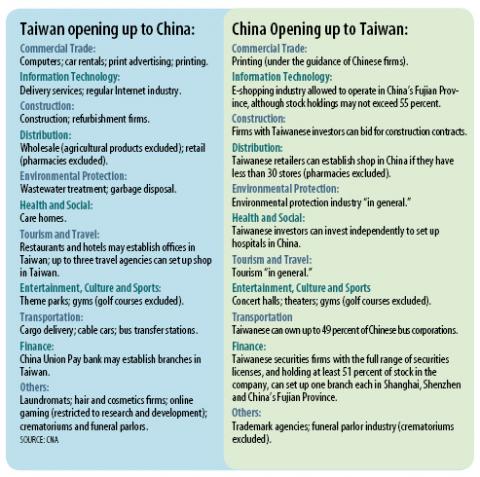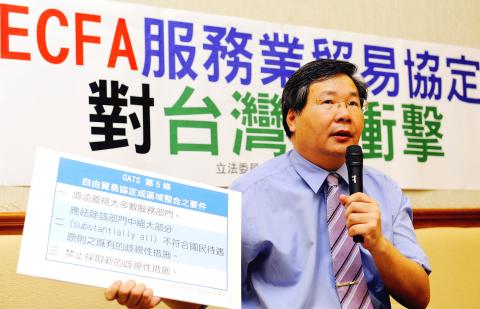The signing of a service trade agreement with China could affect issues on the legislature’s agenda during the extra session this week, after the Taiwan Solidarity Union (TSU) yesterday vowed to block all proceedings in the remaining four days.
TSU legislative caucus whip Hsu Chung-hsin (許忠信) told a press conference that the trade pact would subject local businesses to fierce competition, bring in white-collar Chinese workers, and lead to an outflow of Taiwanese expertise and knowledge to China.
The service trade agreement is one of the follow-up agreements to the Economic Cooperation Framework Agreement (ECFA) which came into effect in July 2010.

GRAPHIC: TT
Although there are more stringent restrictions on Chinese investments in certain industries covered by the service trade agreement, under WTO rules, those safeguards will have to be lifted after the end of the interim period of 10 years following the ECFA’s signing, Hsu said.
“From then on, Taiwan will be wide open to China” because limiting the number of China-funded firms, share holdings, scope of business activities and recruitment of Chinese employees would be considered a violation of the core principles of the WTO, Hsu said.
Under the agreement, China would open 80 service sectors to Taiwan, while Taiwan would open 64 sectors to China. The sectors include those related to commerce, telecommunications, construction, distribution, the environment, health, tourism, entertainment, culture, sports, transportation and finance.

Photo: George Tsorng, Taipei Times
The wide range of industries covered by the trade pact was not made public until the agreement was signed at 2pm on Friday in Shanghai.
Hsu said that financial conglomerates would benefit from the agreement because the pact would facilitate access to the Chinese banking, insurance and securities markets, but that will “come at the expense of the majority of small and medium-sized enterprises and workers in Taiwan.”
The TSU demanded that Premier Jiang Yi-huah (江宜樺) present the pact before the legislature to discuss with lawmakers how it would affect the nation, and that the deal should take effect only after the legislature approves it.
The TSU will boycott the remaining days of the extra session scheduled for next month to force the Chinese Nationalist Party (KMT) to agree to its demands, Hsu said.
During the session, the KMT had expected to pass an amendment to the Income Tax Act (所得稅法) to scrap the 8,500-point TAIEX threshold that automatically triggers the imposition of the tax on most individual investors. It also wants to pass a proposed referendum on the Fourth Nuclear Power Plant in New Taipei City’s (新北市) Gongliao District (貢寮) as well as clearing a number of other bills before the extra session ends on Thursday.
The KMT also considers the draft senior secondary education act (高級中等教育法) as urgent, considering the limited time left to prepare for the planned 12-year education scheme, set to begin in August next year.
Lawmakers across party lines on Friday called for a full and detailed examination of the signed service trade pact, with the opposition demanding that the legislature examine the deal thoroughly before deciding whether to allow it to go into effect.
KMT caucus whip Lin Hung-chih (林鴻池) yesterday said his party was not opposed to a review of the agreement by the legislature, but did not consider it necessary that Jiang present it at a question-and-answer session with lawmakers.
Lin said the KMT hoped the bills that were scheduled to be dealt with this week would not be delayed by the service trade pact issue.
Democratic Progressive Party (DPP) caucus whip Ker Chien-ming (柯建銘) asked President Ma Ying-jeou (馬英九) to step forward to address the public’s concerns.
Ker said the DPP would otherwise boycott a review of the agreement and demanded that the agreement be overruled and that Taiwan restart negotiations with China over the opening up of the service sector.

Chinese Nationalist Party (KMT) lawmakers have declared they survived recall votes to remove them from office today, although official results are still pending as the vote counting continues. Although final tallies from the Central Election Commission (CEC) are still pending, preliminary results indicate that the recall campaigns against all seven KMT lawmakers have fallen short. As of 6:10 pm, Taichung Legislators Yen Kuan-heng (顏寬恒) and Yang Chiung-ying (楊瓊瓔), Hsinchu County Legislator Lin Szu-ming (林思銘), Nantou County Legislator Ma Wen-chun (馬文君) and New Taipei City Legislator Lo Ming-tsai (羅明才) had all announced they

CHAMPIONS: President Lai congratulated the players’ outstanding performance, cheering them for marking a new milestone in the nation’s baseball history Taiwan on Sunday won their first Little League Baseball World Series (LLBWS) title in 29 years, as Taipei’s Dong Yuan Elementary School defeated a team from Las Vegas 7-0 in the championship game in South Williamsport, Pennsylvania. It was Taiwan’s first championship in the annual tournament since 1996, ending a nearly three-decade drought. “It has been a very long time ... and we finally made it,” Taiwan manager Lai Min-nan (賴敏男) said after the game. Lai said he last managed a Dong Yuan team in at the South Williamsport in 2015, when they were eliminated after four games. “There is

Nvidia Corp CEO Jensen Huang (黃仁勳) yesterday visited Taiwan Semiconductor Manufacturing Co (TSMC, 台積電), as the chipmaker prepares for volume production of Nvidia’s next-generation artificial intelligence (AI) chips. It was Huang’s third trip to Taiwan this year, indicating that Nvidia’s supply chain is deeply connected to Taiwan. Its partners also include packager Siliconware Precision Industries Co (矽品精密) and server makers Hon Hai Precision Industry Co (鴻海精密) and Quanta Computer Inc (廣達). “My main purpose is to visit TSMC,” Huang said yesterday. “As you know, we have next-generation architecture called Rubin. Rubin is very advanced. We have now taped out six brand new

POWER PLANT POLL: The TPP said the number of ‘yes’ votes showed that the energy policy should be corrected, and the KMT said the result was a win for the people’s voice The government does not rule out advanced nuclear energy generation if it meets the government’s three prerequisites, President William Lai (賴清德) said last night after the number of votes in favor of restarting a nuclear power plant outnumbered the “no” votes in a referendum yesterday. The referendum failed to pass, despite getting more “yes” votes, as the Referendum Act (公民投票法) states that the vote would only pass if the votes in favor account for more than one-fourth of the total number of eligible voters and outnumber the opposing votes. Yesterday’s referendum question was: “Do you agree that the Ma-anshan Nuclear Power Plant